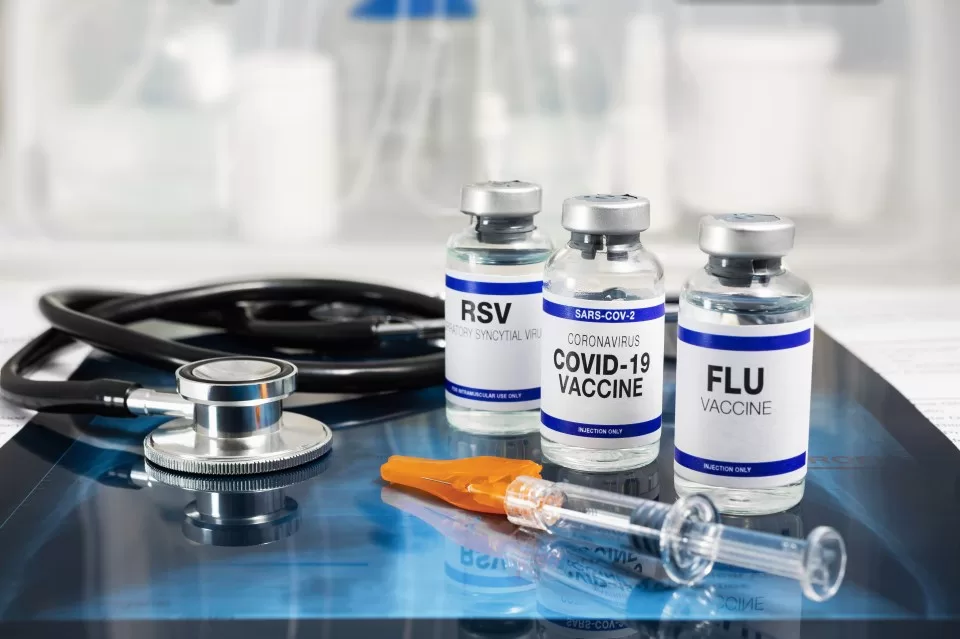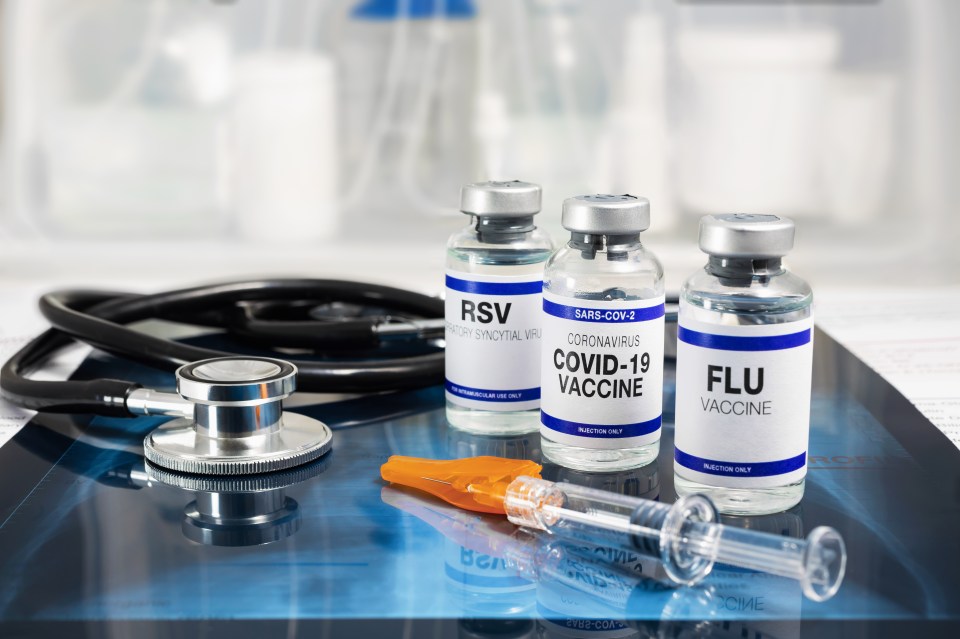MILLIONS of Brits have been urged to book a lifesaving new jab that offers 86 per cent protection against a killer lung infections, studies show.
Scientists behind the research say 2,800 deaths could be prevented every year if 70 per cent of eligible adults took up the offer of a vaccine.
The respiratory syncytial virus (RSV) is a common cause of coughs and colds that can be particularly dangerous to some.
Babies, adults over 75, people with heart and lung disease or anyone with a weak immune system is at greater risk of severe RSV infection and may need admission to hospital, particularly in the winter months.
RSV can cause serious lung infections in very young infants, but growing evidence also shows that the virus can cause serious chest infections in older adults.
The super-common virus is estimated to result in 8,000 deaths in the UK every year.
The NHS rolled out vaccines offering protection against the sometimes deadly virus across England earlier this month.
Anyone aged between 75 and 79 is eligible for one dose of Pfizer‘s jab Abrysvo, as are women who are at least 28 weeks pregnant – a shot of the RSV vaccine can keep them and their babies safe.
Now, new research from the University of Aberdeen and the MRC-University of Glasgow Centre for Virus Research found the vaccines to be 86 percent effective in preventing RSV-related lower respiratory tract infections in the first year after vaccination.
The team reviewed evidence on how effective RSV vaccines were for older adults and people with weak immune systems.
Their analysis showed that if 70 percent of eligible adults were to have the RSV vaccine, up to 2,800 deaths could be prevented in the UK every year.
Prof Roy Soiza, who led the research at the University of Aberdeen, said: “Our review found that the vaccines are safe and effective and we are calling on healthcare professionals and carers to encourage those invited to receive the vaccine to take up the opportunity.
“There is evidence of effectiveness in preventing RSV-related lower respiratory tract infections of around 86 percent in the first year after vaccination.
“Trials have been conducted in people aged over 60 years of age, including those with underlying medical conditions, but the number of volunteers aged 80 or over was too small to be certain of the extent of benefit.
“Nevertheless, we saw in the Covid pandemic that the effectiveness of vaccines in trials of younger and healthier people was replicated in those who were much frailer and older.
“We therefore urge those with an interest in the care of older people to encourage those eligible and invited to have the new vaccine to take it.”
Researchers also found that around 36,000 GP consultations, 4,600 hospitalisations and 1,000 ICU admissions could be avoided if 70 per cent of eligible adults had their RSV vaccine.
At present, RSV is behind 175,000 GP interventions every year.
“The NHS is badly stretched, so efforts to reduce the healthcare burden from avoidable communicable diseases such as RSV infection are highly desirable,” Prof Soiza added.
He called on healthcare professionals to spread the word about the the effectiveness of the RSV vaccine.
How to book your RSV vaccine
If you’re eligible to receive an RSV vaccine, you’ll most likely be contacted by your GP surgery and be offered an appointment for a jab.
Some pharmacies will also be offering the vaccine.
You can visit nhs.uk/book-rsv to book a pharmacy appointment near you
It’s best to get your RSV vaccine on a different day from your flu and Covid-19 vaccine to ensure its effectiveness.
What other jabs do I need this winter?
The NHS has also urged eligible adults to come forward for Covid-19 and flu vaccines, which can be done on the same day.
In line with JCVI advice, those eligible for a flu vaccine this year include:
From 3 October:
- Those aged 65 years and over
- Those aged 18 years to under 65 years in clinical risk groups (as defined by the Green Book)
- Those in long-stay residential care homes
- Carers in receipt of carer’s allowance, or those who are the main carer of an elderly or disabled person
- Close contacts of immunocompromised individuals
- Frontline workers in a social care setting without an employer led occupational health scheme – including those working for a registered residential care or nursing home, registered domiciliary care providers, voluntary managed hospice providers
- Those who receive direct payments (personal budgets) or Personal Health budgets, such as Personal Assistants.
From 1 September:
- pregnant women
- all children aged 2 or 3 years on 31 August 2024
- primary school aged children (from Reception to Year 6)
- secondary school aged children (from Year 7 to Year 11)
- all children in clinical risk groups aged from 6 months to less than 18 years
Those eligible for an autumn Covid booster are:
- Residents in a care home for older adults
- All adults aged 65 years and over
- Persons aged 6 months to 64 years in a clinical risk group, as defined in the Green Book, including pregnant women
- Frontline health and social care workers and staff in care homes for older adults
“Although some sections of social media are often dominated by anti-vaccine messages, it is important that reliable public health messages cut through the noise,” he explained.
It comes after the NHS invited Brits to book lifesaving flu and Covid-19 vaccines, ahead of a looming winter illness “tripledemic”.
Booking for the vaccines opened on September 23 and they’ll begin to be administered on October 3.
‘SIGNIFICANT STEP’
Scotland also recently rolled out its RSV vaccination programme too, inviting adults over 75 and pregnant women to book the jab in August.
Dr Sam Ghebrehewet, Head of Immunisation and Vaccination at Public Health Scotland, described the launch as a “significant step forward to protect the health of the population”.
He said: “RSV can be very serious for those who are more vulnerable, such as older adults.
“In recent years, we’ve seen an increase in those aged 75 years and over being hospitalised for RSV.
Symptoms of RSV
PEOPLE commonly show symptoms of the virus four to six days after being infected.
Signs include:
- Runny nose
- Decrease in appetite
- Coughing
- Sneezing
- Fever
- Wheezing
But symptoms can be much more subtle in very young babies, including irritability, decreased activity and breathing difficulties.
Most children will have had an RSV infection by their second birthday.
It can cause a condition called bronchiolitis in babies and young children.
Symptoms of bronchiolitis in very young infants include:
- Refusal to breastfeed or bottle-feed
- Breathing more quickly and noisily (wheezing)
- Seeming very tired, upset or inactive
- Signs of dehydration – lack of tears when crying, little or no urine in their nappy for six hours, and cool, dry skin
Source: CDC, Asthma + Lung UK
“That’s why we’re asking all those who are eligible for the RSV vaccine to take up the offer to protect themselves against the more serious complications of an RSV infection.”
Antonia Ho, Professor of Infectious Diseases at the MRC-University of Glasgow Centre for Virus Research, who collaborated on the research said: “The availability of the first effective RSV vaccines in the UK is really exciting.
“Along with existing influenza and Covid-19 vaccines, they will allow us to protect vulnerable groups from serious lung infections, and reduce the enormous pressures faced by the NHS in the winter months.
“The vaccination catch-up campaign for 76-79 years is due to end on 30 September 2024 and I would urge those who are eligible to attend their vaccination appointment.”

